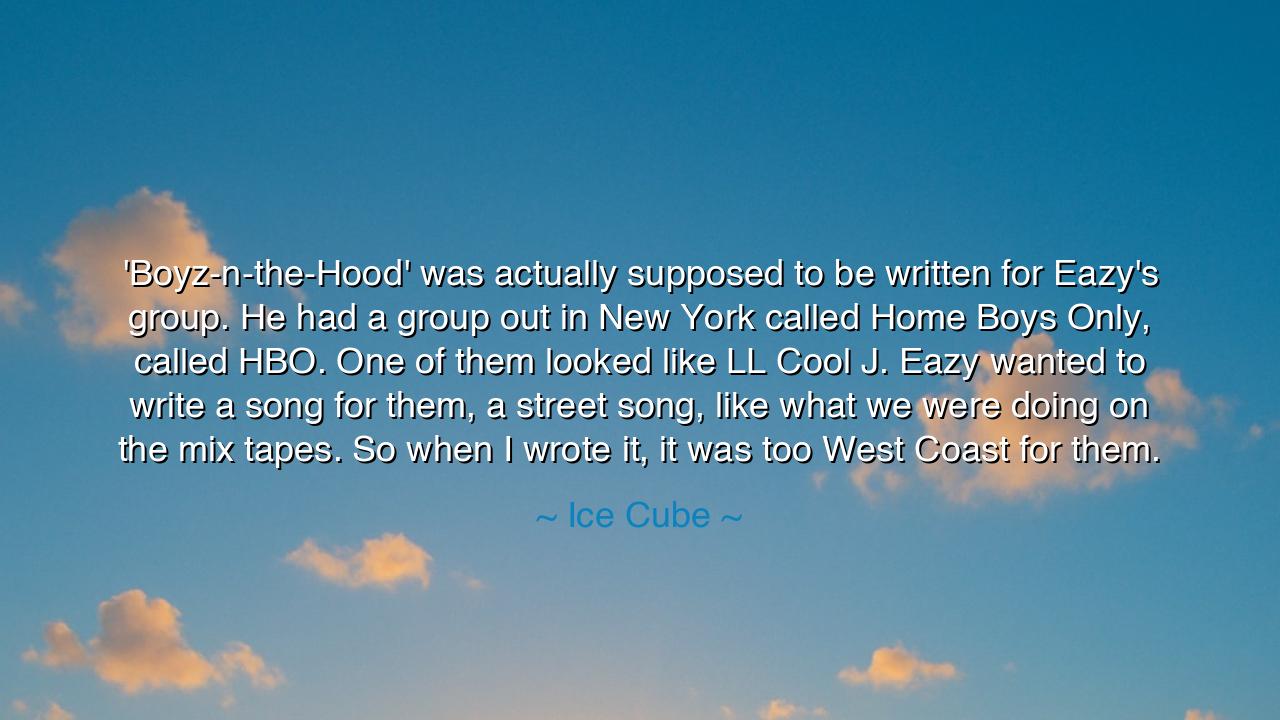
'Boyz-n-the-Hood' was actually supposed to be written for Eazy's
'Boyz-n-the-Hood' was actually supposed to be written for Eazy's group. He had a group out in New York called Home Boys Only, called HBO. One of them looked like LL Cool J. Eazy wanted to write a song for them, a street song, like what we were doing on the mix tapes. So when I wrote it, it was too West Coast for them.






In the creation of art, there are moments when the unexpected births something that transcends its origins. Ice Cube's reflection on the creation of the iconic song "Boyz-n-the-Hood" reveals a story of evolution and the power of authenticity. As he recalls, “Boyz-n-the-Hood was actually supposed to be written for Eazy’s group. He had a group out in New York called Home Boys Only, called HBO. One of them looked like LL Cool J. Eazy wanted to write a song for them, a street song, like what we were doing on the mix tapes. So when I wrote it, it was too West Coast for them.” In these words, Ice Cube reflects on the process of creation and how the cultural tension between the East Coast and West Coast styles of rap shaped the trajectory of the song. It speaks not only to the power of place in the development of art, but also to the idea that authenticity—the reflection of one’s own culture—cannot be contained or imitated without losing its essence.
The ancient philosophers understood that authenticity is not just a matter of personal identity but is tied to the very nature of art itself. Plato, in his pursuit of the ideal forms, often discussed the concept of mimesis, or imitation. But even Plato understood that when an artist attempts to imitate something too far removed from their own experience or culture, it loses its power. What makes art genuine and impactful is when it speaks from a place of truth and experience, rooted in the artist’s own identity and background. This is what makes Ice Cube’s words so powerful: the authenticity of the West Coast sound, the street rhythms, and the raw experiences of the community could not be replicated by a group not rooted in that same environment. In essence, the song “Boyz-n-the-Hood” could only be born from the place where it was truly felt—the West Coast.
Consider the story of the great poet Homer, whose epics, The Iliad and The Odyssey, were shaped by his own deep understanding of the ancient world. Homer did not merely recount events; he infused his work with the truths of his own culture—its values, its struggles, its vision of the gods and men. His works are timeless because they are rooted in authentic experience, transcending the borders of his homeland to touch the very soul of humanity. Much like Homer, Ice Cube was not simply writing lyrics; he was reflecting the soul of his community, embedding the truth of the West Coast experience into the music. That authenticity is what gave “Boyz-n-the-Hood” its raw power—it was not just a song, but an expression of a very real world.
The tension between the East Coast and West Coast rap scenes can be understood as a metaphor for the larger battle between cultural identity and the temptation to impose one culture over another. LL Cool J, the East Coast rapper Ice Cube refers to, was a defining voice of his region, representing a very different experience and style. When Ice Cube wrote the song, it was imbued with the very essence of the West Coast: the rhythm, the feel, the street stories, the dialect. It was too much of one place to fit another, and therein lies the deeper lesson: authenticity cannot be forced. It must arise naturally from the artist’s environment and experience, or it will lack the power to connect with others.
As Ice Cube acknowledges, the song, though meant for a different group, ended up becoming a foundational piece in the West Coast rap legacy. The rejection of the song by Home Boys Only and its eventual success with N.W.A. and the West Coast rap scene illustrates the timeless truth that authenticity finds its audience, even when it is initially misunderstood or rejected. It speaks to the idea that true art comes from the soul of a community, not from what is popular or expected. The world often does not recognize the power of true authenticity until it is presented in its most raw and uncompromised form.
The lesson of Ice Cube’s words is one of courage and confidence in one’s own identity. There is no shame in being true to where you come from, to the culture that shaped you. In fact, it is this very truth that gives power to your voice. The greatest artists in history, like Ice Cube, Homer, and others, have found their place in the world by embracing their roots—by creating art that reflects their own experiences and truths. The world may not always understand or accept it at first, but in the end, it is these authentic creations that endure.
In our own lives, we must learn to embrace our own truth and cultural heritage. Whatever our background, whatever our community, it is from these places that we can create our most powerful work—whether it be through art, action, or thought. Just as Ice Cube stayed true to the West Coast roots of his music, so must we stay true to the experiences and beliefs that shape us. Let us create with authenticity and passion, knowing that the world may not always understand, but in time, our truth will find its place. In doing so, we honor the timeless wisdom that true art is always born from the courage to be real, to be rooted in our experience, and to express that truth without fear.






AAdministratorAdministrator
Welcome, honored guests. Please leave a comment, we will respond soon